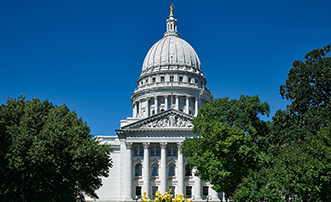The next few months are a crucial time for advocacy! Budget season is upon us in Wisconsin and the decisions being made by our elected officials now will impact the services and programs available to us over the next two years.
Wisconsin has a biennial budget, meaning that every two years the state government must create a new budget to determine if and how various state agencies and programs are funded. Read on to learn more about the process.
• In the fall, prior to a budget year, state agencies submit their budget requests, laying out the cost to administer existing programs/services or create new ones. The Governor provides guidance limiting overall spending or promoting certain services.
• In late fall/early winter of budget years, the Governor holds listening sessions on various segments of the budget (i.e. human services, the environment, infrastructure, the economy etc.). These listening sessions are an opportunity for the general public to provide input on what they think should be funded in the budget.
• Around February, the Governor shares his budget proposal, usually in an address to the public. The Governor’s budget proposal is designed to highlight his budget priorities.
• At this point, the budget process moves over to the Legislature. The Joint Finance Committee, which is comprised of legislators from both houses, conducts a series of hearings around the state, allowing the public to give their input. The information gathered from these hearings, as well as other sources, is then used to create another budget proposal. The results are often quite different from the one put forth by the Governor.
• Once the Joint Finance Committee has created their budget proposal, it then moves to either the full Assembly or full Senate, where members are able to propose changes and debate their ideas. Eventually the entire membership of that house will vote on the bill and if it passes, it then moves to the other house of the Legislature where the process repeats.
• If the two houses pass bills that significantly differ, as is often the case, then a Conference Committee comprised of members of both houses is created to find a compromise between the two proposals. Once a compromise bill has been completed, it goes back to the Assembly and Senate for a vote and, hopefully, passage.
• Once both houses have passed the compromise budget bill, it goes to the Governor to sign into law. Prior to signing, the Governor has the power to make line-item vetoes, which means he can cross things out, change dollar amounts, or delete specific language that changes the specific meaning of the provision. The Legislature can override these vetoes, but it requires a two-thirds vote of both houses to accomplish.
• The very last step is the Governor signing the budget into law.
As you can see from this process, your elected officials want to hear from you about what you think should be funded through the state budget process. Stay tuned to Advocacy in Action over the next few months as we highlight key advocacy issues that affect older adults and people with disabilities so you can make your voice heard!
Source: www.wisconsinbudgetproject.org/budget-toolkit/the-wisconsin-budget-process




